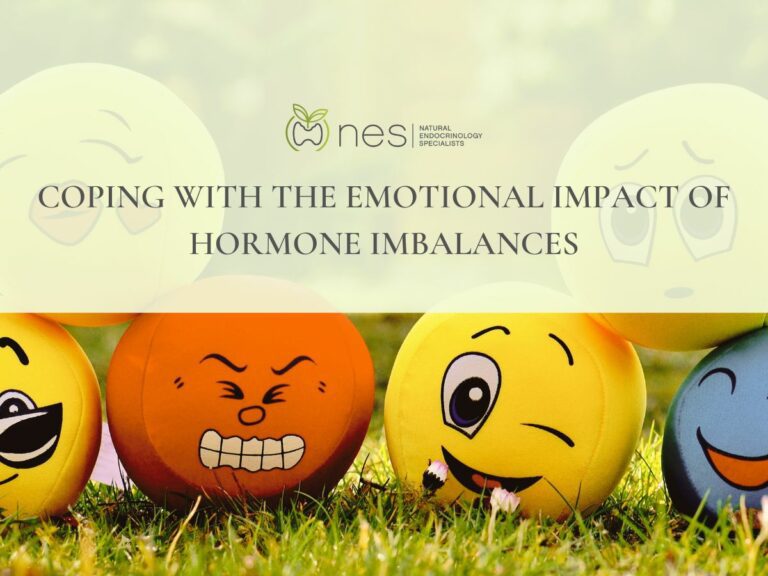Hormonal imbalances can have a significant impact on mental health, causing or worsening symptoms like anxiety, depression, mood swings, and irritability. Hormones play a crucial role in regulating bodily processes, including metabolism, mood, reproductive function, and sexual health. Hormone dysregulation occurs when too much or not enough of a hormone is released by the endocrine […]

Hormonal imbalances can have a significant impact on mental health, causing or worsening symptoms like anxiety, depression, mood swings, and irritability. Hormones play a crucial role in regulating bodily processes, including metabolism, mood, reproductive function, and sexual health.
Hormone dysregulation occurs when too much or not enough of a hormone is released by the endocrine system, and it can be caused by lifestyle factors such as poor sleep, poor eating habits, not getting enough exercise, or existing medical conditions.
In this blog, we will explore how to cope with the emotional impact of hormone imbalances and the connection between hormones and mental health.
Hormones act as messengers in the body, transmitting signals that influence mood, stress levels, and overall emotional health. Understanding hormone imbalances requires a closer look at the key players involved.

The emotional toll of hormone imbalances can be significant, often manifesting in a range of symptoms that affect daily life and well-being. Identifying these emotional impacts is crucial for developing effective coping strategies.
Hormones play a crucial role in emotional well-being, as they help regulate mood, sleep, appetite, and other functions. Understanding the connection between hormones and mental health can help individuals better manage their emotional well-being and make informed decisions about their health.

Hypothyroidism, a condition characterized by an underactive thyroid, manifests in various ways that profoundly affect emotional well-being. Fatigue, weight gain, and depression are common symptoms that can significantly impact daily life.
The thyroid hormones play a crucial role in mood regulation and overall mental health, making it essential to address these imbalances. Below are some coping strategies:
Hyperthyroidism, characterized by an overactive thyroid, presents its own set of challenges. Anxiety, irritability, and heart palpitations are hallmark symptoms that can take a toll on mental well-being. Recognizing and addressing these symptoms is crucial for effective coping. Below are some coping strategies:
Estrogen, a key hormone in the female reproductive system, extends its influence beyond the physical to impact mood and cognitive function. Imbalances in estrogen levels are often linked to mental health disorders, including depression and anxiety. Below are coping strategies:
For individuals using hormonal birth control, understanding its impact on estrogen levels and mental health is crucial. While contraception provides reproductive control, it can also influence emotional well-being. Below are some coping strategies:
Progesterone, another essential hormone, plays a significant role in mood regulation. Imbalances in progesterone levels can lead to mood swings, irritability, and even depression.
Below are some coping strategies:
Testosterone, often associated with male characteristics, also plays a crucial role in mental health. Imbalances can result in symptoms like anxiety, depression, and cognitive decline. Below are some coping strategies:
The adrenal system, responsible for hormone production, can significantly impact mental health when imbalances occur. Symptoms such as anxiety, fatigue, and mood swings may indicate adrenal hormone issues. Below are some coping strategies:
Addressing hormone imbalances requires a holistic approach, often involving the expertise of healthcare professionals. Seeking guidance is a crucial step in managing and mitigating the emotional impact of hormonal fluctuations.
Lifestyle choices play a pivotal role in influencing hormonal balance. Adopting a holistic approach to wellness can contribute significantly to emotional stability.

For some individuals, hormone replacement therapy (HRT) may be a viable option to address hormonal imbalances. Understanding the basics of HRT, its benefits, and potential risks is essential for making informed decisions.
HRT is tailored to address these imbalances by introducing synthetic hormones into the body. For women experiencing menopausal symptoms, estrogen and progesterone are commonly prescribed, while men with low testosterone levels may receive testosterone replacement. The goal is to mitigate symptoms and enhance the overall quality of life.
Beyond lifestyle changes and medical interventions, developing effective emotional coping strategies is paramount for navigating the emotional rollercoaster associated with hormone imbalances.
The path to emotional well-being amidst hormone imbalances involves a multifaceted approach. Understanding the intricacies of hormonal fluctuations, embracing lifestyle changes, considering hormone replacement therapy judiciously, and implementing effective emotional coping strategies collectively form a holistic strategy.
By empowering individuals with knowledge and practical tools, we pave the way for a more resilient and balanced emotional state. As we embark on this journey together, let these insights serve as a beacon of hope and guidance, fostering a sense of control and empowerment in the face of hormonal challenges.

Acupuncture Session - $189.00
Acupuncture, Package of 4 - $636.00
Female Pellet Insertion Package - $518.00
Male Pellet Insertion Package - $744.00